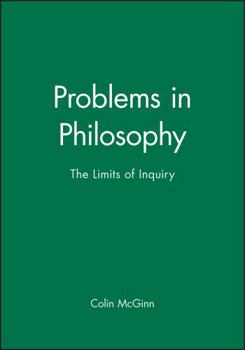Problems in Philosophy: The Limits of Inquiry
This advanced introductory text offers a synoptic view of philosophical inquiry, discussing such topics as consciousness, the self, meaning, free will, the a priori, and knowledge. The emphasis is on... This description may be from another edition of this product.
Format:Paperback
Language:English
ISBN:1557864756
ISBN13:9781557864758
Release Date:October 1993
Publisher:Wiley-Blackwell
Length:176 Pages
Weight:0.55 lbs.
Dimensions:0.6" x 6.0" x 9.0"
Customer Reviews
2 ratings
Profound Pessimism about Philosophical Progress
Published by Thriftbooks.com User , 14 years ago
This book presents a theory about the nature of philosophical dialectic and a diagnosis of philosophical failure. Colin McGinn presents a model called "DIME", an acronym describing the nature of rival philosophical theories on various problems, and introduces an alternative way of thinking of the problems, Transcendental Naturalism. McGinn explains how the DIME model applies to problems about consciousness, the self, meaning, free will, the a priori and skepticism. Philosophers address these phenomena by domesticating (D) or reducing them, by postulating something irreducible (I) or even magical (M) about them, or if all else fails, by eliminating (E) or denying the phenomenon. His alternative theory is that the facts about these phenomena are perfectly natural, but elude our reasoning. We are cognitively closed in understanding the answers to problems, in much the same way that animals cannot understand some things that we can, without these things involving anything really profound. In my opinion, this theory is more plausible about some phenomena than others. Readers may disagree about whether and when the theory is plausible depending on how optimistic they are about DIME theories of the phenomena. But it has some explanatory power, and is not very unlikely given the origin or purpose of our cognitive faculties. One significant criticism is that the alternative need not be naturalistic. As one reviewer elsewhere has pointed out, someone who believes in the supernatural could also accept McGinn's main point - so long as he thinks that introducing the supernatural doesn't solve the problems. The writing is generally clear, but sometimes a little heavy. The book is well organized, each chapter having the same structure, first explaining the problem, then applying the DIME model, and then introducing Transcendental Naturalism; however, this makes it a bit predictable and repetitive. This is an insightful and original treatment of philosophical problems. The cover advertises the book as something of an introduction; however, it will be extremely difficult for those unfamiliar with contemporary analytic philosophy. It will be of interest to upper-lever undergraduates and graduate students in philosophy as well as professional philosophers.
The problems of philosophy are beyond human understanding
Published by Thriftbooks.com User , 15 years ago
The thesis of this book is that the typical problems of philosophy such as conscience, mind/body duality, free will, meaning, etc. are beyond the scope of human brain's capabilities. In the same way as General Relativity can be understood by (some) humans but not by dogs, perhaps there are "Martians" for whom the Free Will problem is easy, but for us it is impossible. This is why philosophy has advanced so little in over 2,000 years. It is an interesting thesis that the author does not claim to prove but he suggests it, analyzing the different alternatives to various philosophical conundrums in a rather reiterative way. It would be in the same direction to other well proven limits to human knowledge such as the Uncertainty Principle and Gödel's Theorem. However, as a layman in philosophy, I have some doubts. Science has taken away from philosophy some of her problems such as the structure of matter, the origin of the universe, etc... It has been done, not just by speculation, but by painstaking mathematical model building together with very sophisticated and costly experiments. Who would dare to say that science will not bring some new light to the problem of conscience and the relation of the mind and the brain? Neurophisiology, equipped with modern exploration instruments and techniques such as tomography, gene coding (see recent article in Scientific American about optogenetics) is already breaking new paths in this research.





